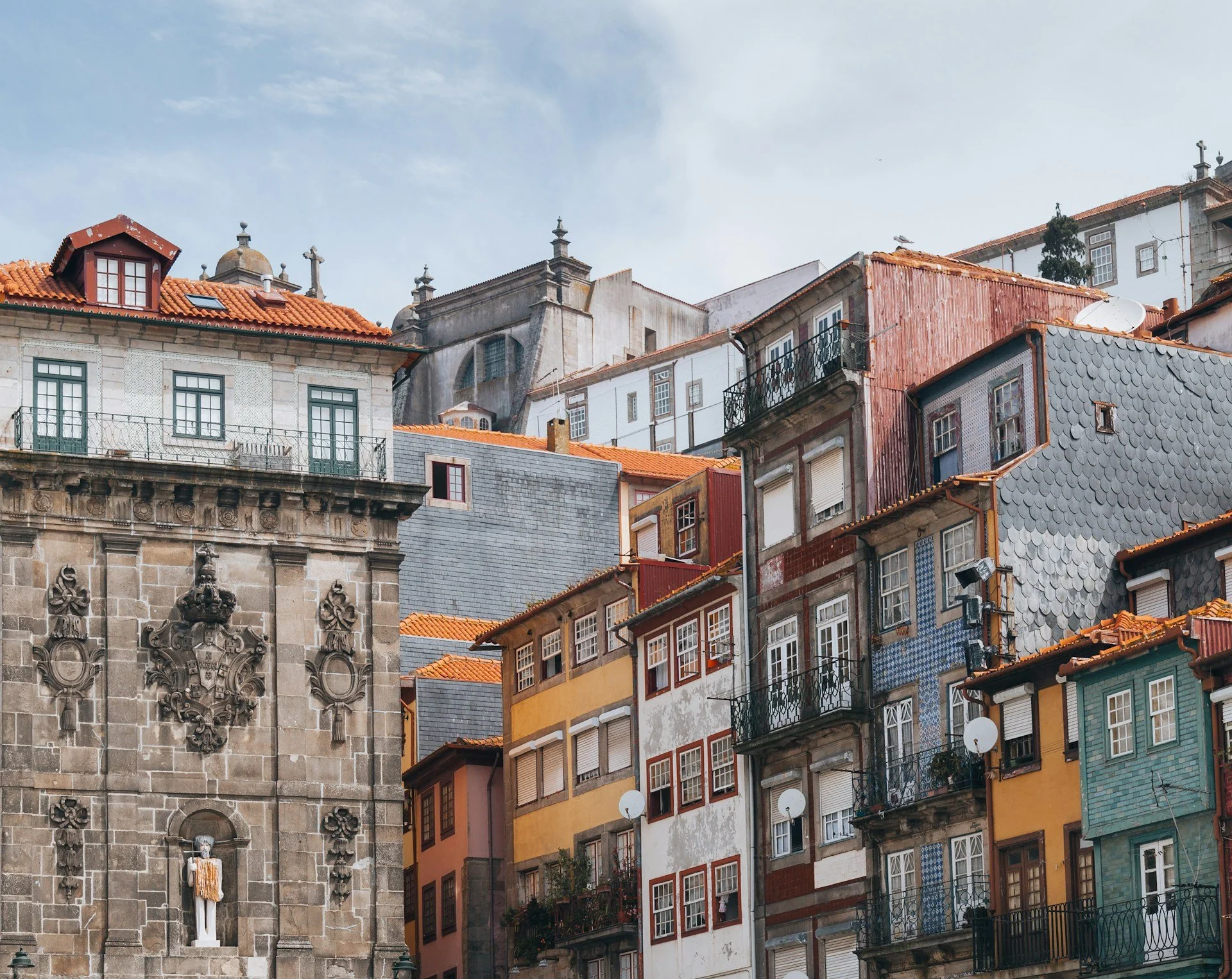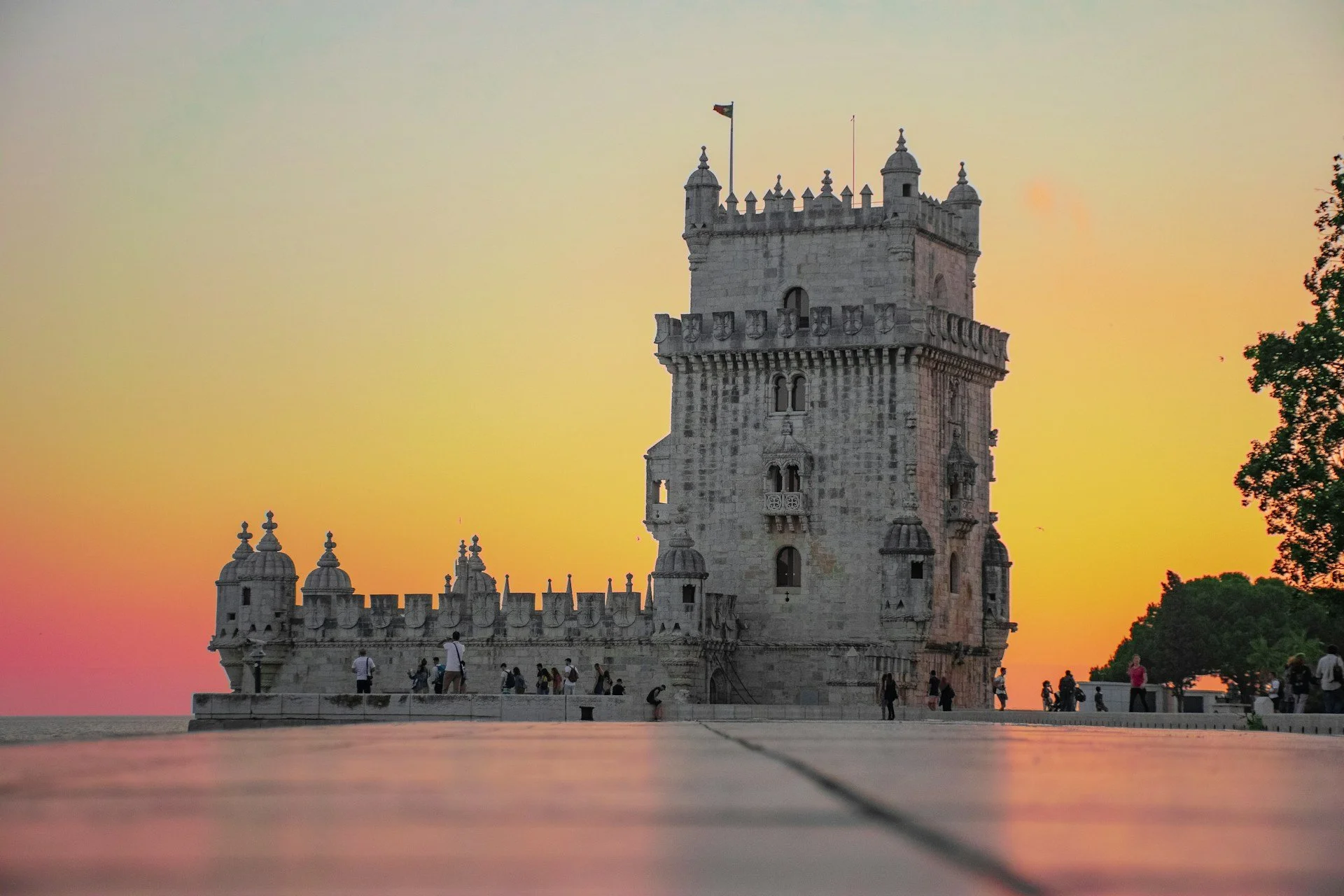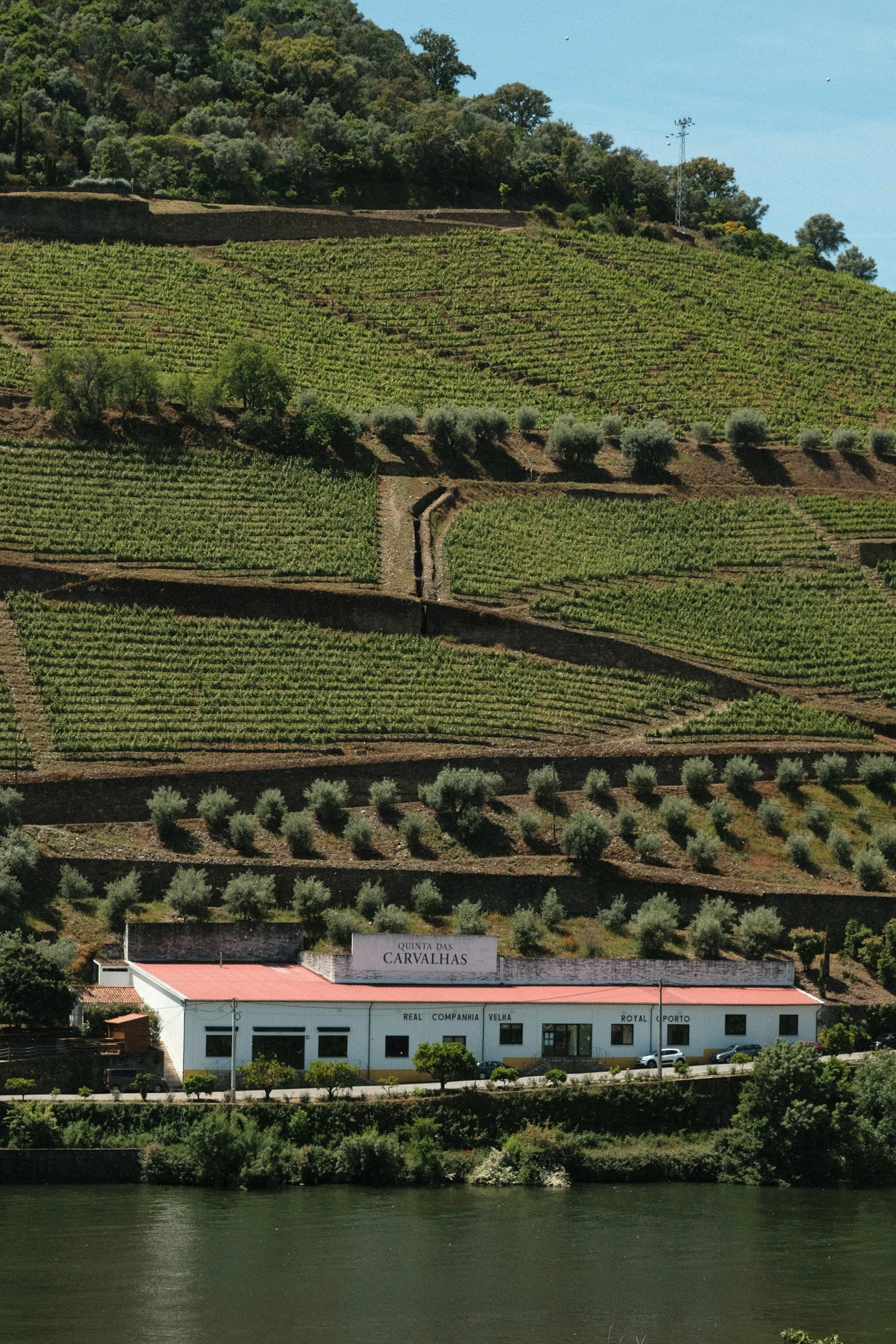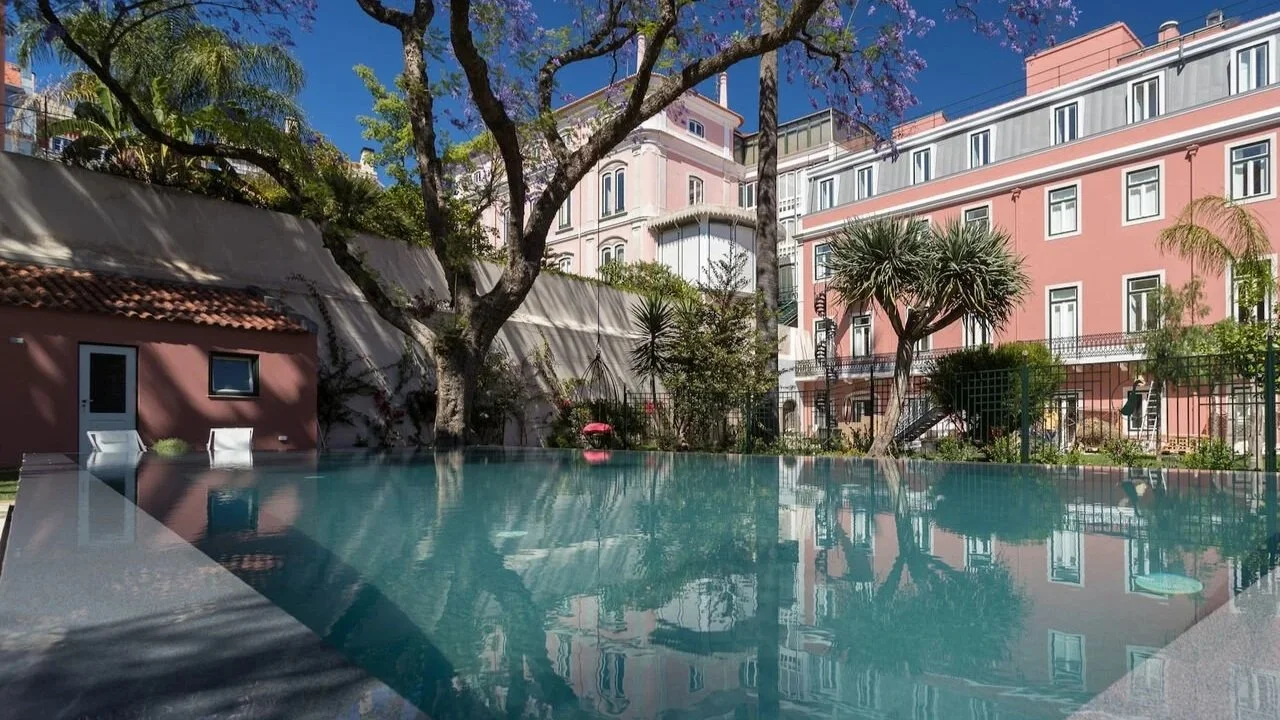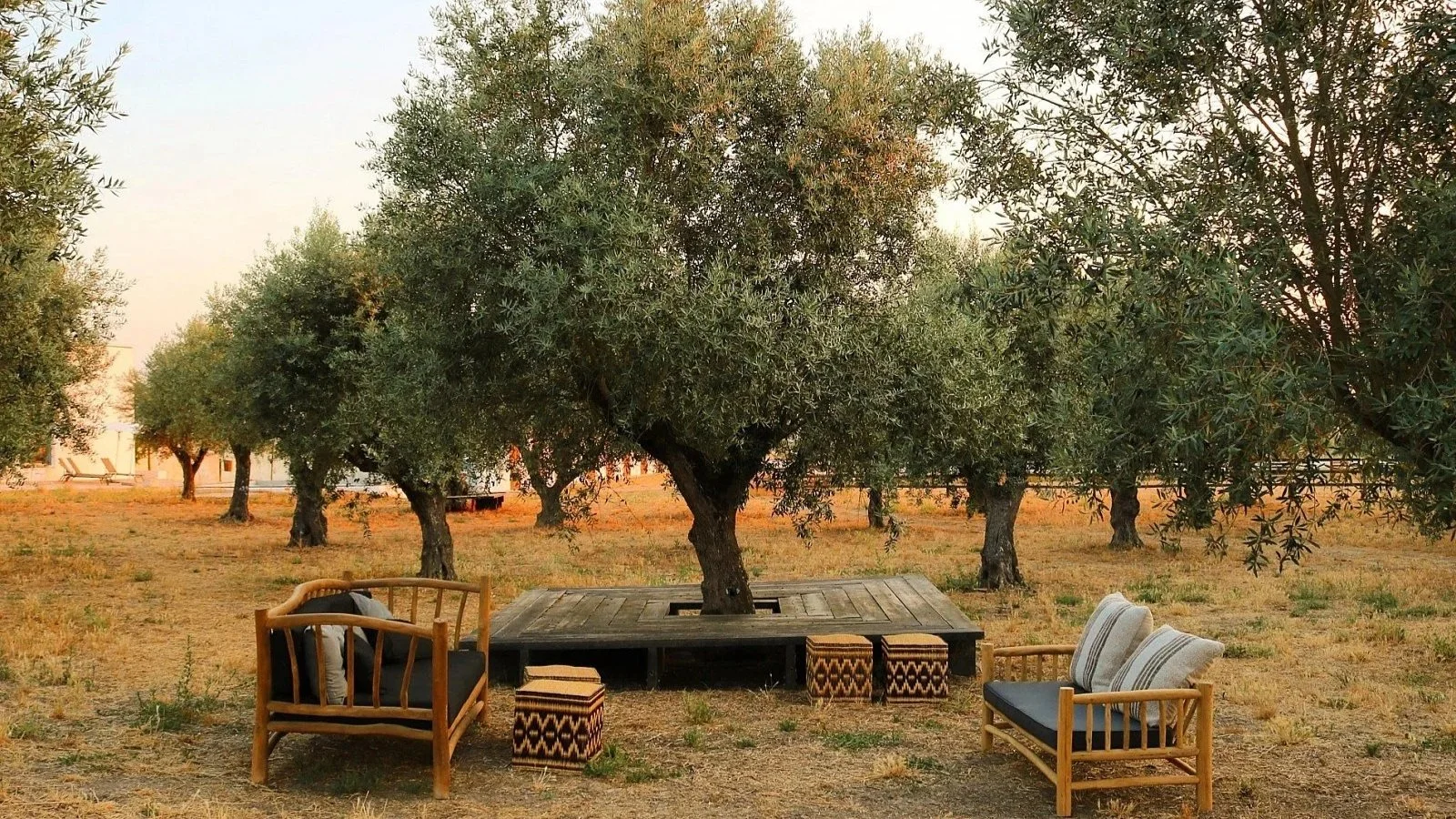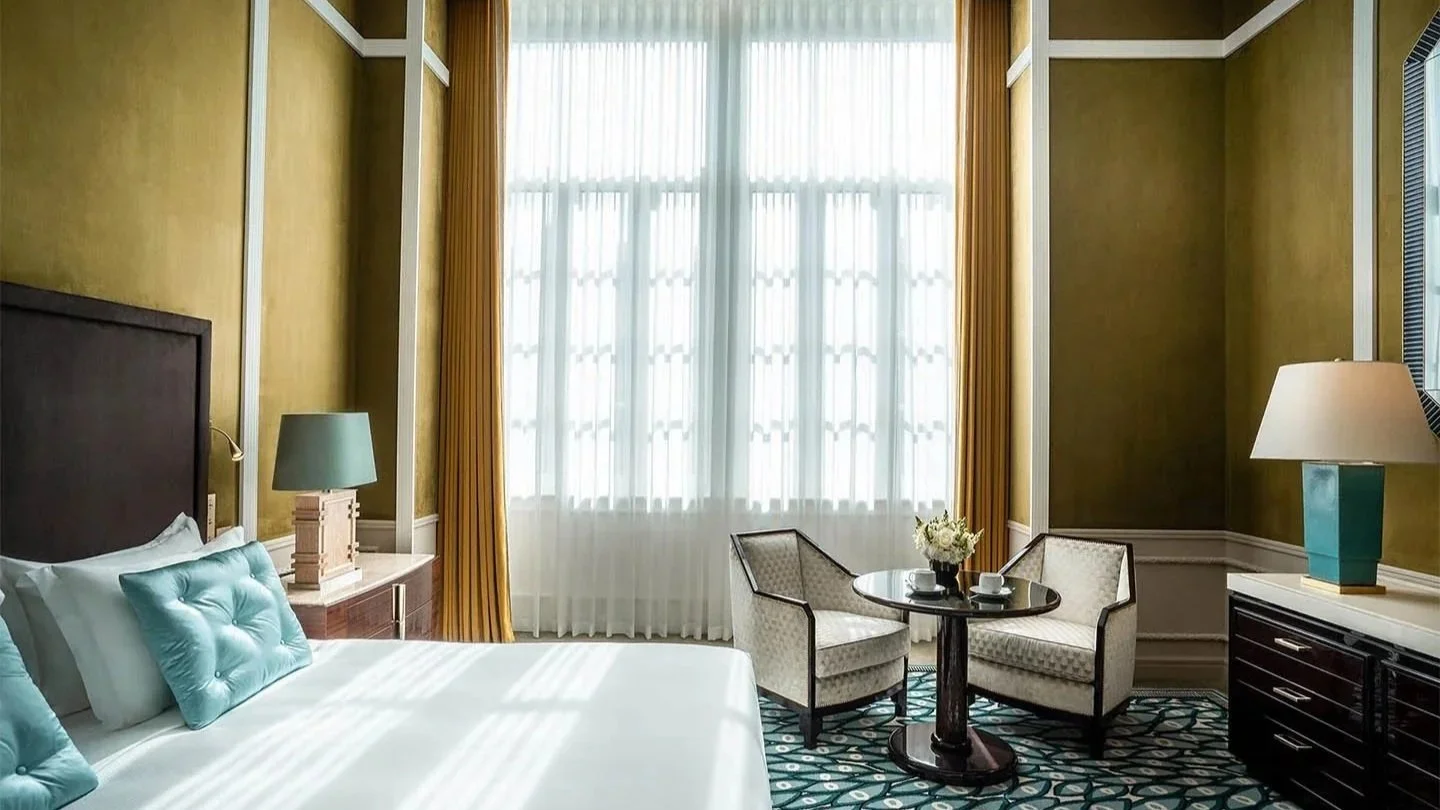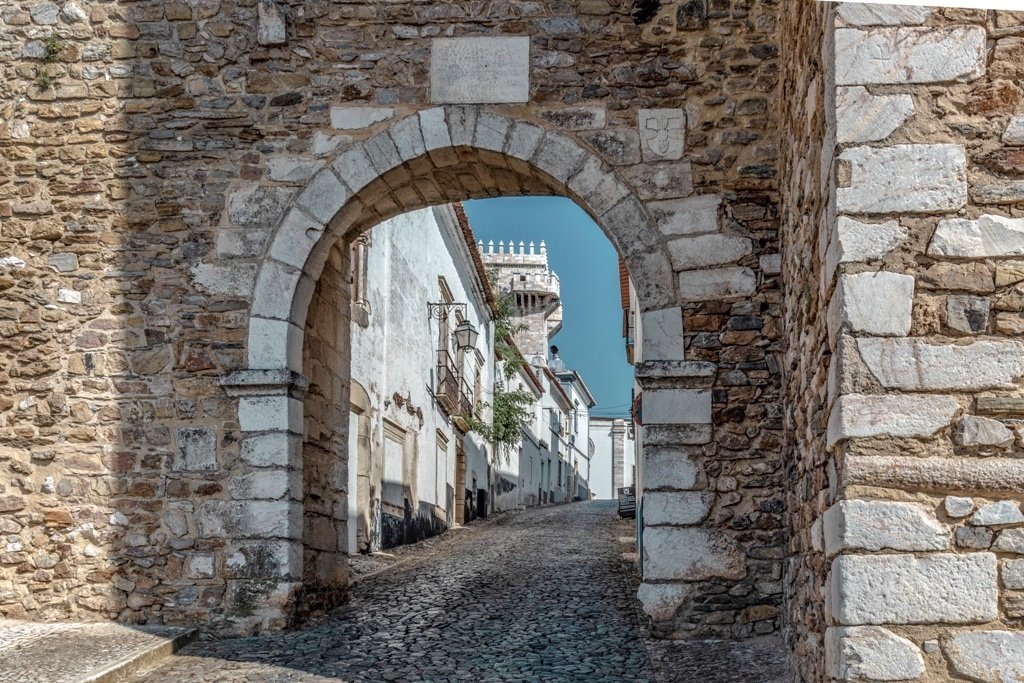A Journey Through Portugal
LISBON, ALENTEJO & PORTO FOOD & WINE TRIP
A journey from Lisbon to Porto through the open country of Alentejo
Explore Lisbon, the Alentejo, Bairrada and Porto on this food and wine journey. Start your trip in Lisbon, the Portuguese capital, where tradition and innovation coexist in neighborhoods spread across hills overlooking the Tagus River. Then you’ll head out of the city to rural Alentejo, an expansive region, famous for cork, olives and wine, dotted with whitewashed villages and hearty red wines. Savor the traditional local cuisine, visit wineries and a cork farm, and stay at a luxurious hotel, a relaxing hiatus. Head north to Porto with a stop for wine and roast suckling pig in Bairrada. Once on Porto, you’ll be immersed in the excellent food and wine of the city shadowing the Douro River.
Lisbon → Alentejo → Porto
☾ 7 Nights
LISBON, ALENTEJO & PORTO FOOD & WINE TRIP
Lisbon → Alentejo → Porto
☾ 7 Nights
DAY 5 - ALENTEJO TO PORTO VIA SPARKLING WINE
Wind north out of the Alentejo toward Porto, Portugal’s second city. On the way, you’ll stop in Bairrada, a region known for its sparkling wines and long-aging Baga reds. Visit iconic winery Luis Pato before a lunch focused on the region’s star dish: roast suckling pig known as leitão. And drink the Portuguese way: Sparkling Bairrada wine with your roast baby pig.
DAY 6 - EXPLORE PORTO & PORT WINE
Your exploration of Porto will begin in earnest with a private walking tour. End your tour at Escondidinho, a slightly upscale yet still very traditional restaurant right in the center of Porto. You can’t miss a port tasting at one of the many port lodges in Vila Nova de Gaia. For a showstopper, dine in at 1 Michelin star Le Monument Restaurant in the The One Monumental Palace Hotel.
DAY 7 - THE ATLANTIC SIDE OF PORTO
Choose your fish at the Matosinhos fish market, only to have it cooked up for you and served in a private dining room just for you. After free time in the afternoon, have a creative bistro dinner at Apego in Porto.
DAY 8 - DEPARTURE
Transfer to the Porto airport or train station for departure.
DAY 1 - LISBON
Start your trip in Lisbon for an introduction to Portugal. A food tour and petiscos lunch with a local guide will give you a taste of classic Portuguese food. Have dinner at Oficio featuring Portuguese small plates with creative twists. A relaxed spot with seriously good food.
DAY 2 - THE ALENTEJO COUNTRYSIDE
The pastoral Alentejo is tailor made for relaxing and meditating on the rolling landscape and historic villages. See the region’s key products up close. First, visit an olive oil producer and winery. Then, have a wine-pairing lunch at Tapada de Coelheiros, where both wine and cork are produced. Head to your countryside hotel, Torre de Palma, and enjoy dinner in.
DAY 3 - RELAXING IN ALENTEJO
Spend the day unwinding at Torre de Palma and enjoy the experiences available here. You might visit the on-site winery that makes superb Alentejo wines, head onto the grounds for a picnic, or enjoy the spa and indoor and outdoor swimming pools. For a more active day, check out the Lusitano horses available to ride or take a bike out to immerse yourself in the Alentejo countryside. Enjoy dinner at one of Estremoz’s best restaurants, Mercearia Gadanha.
DAY 4 - ALENTEJO WINES & CUISINE IN ESTREMOZ
Visit the charming town of Estremoz today. Dona Maria’s beautiful estate, making Alentejo wines, is a luxury treat. Then tour Estremoz with your guide before lunch at Cadeia Quinhentista, a local restaurant specializing in honest Alentejo fare from a wood-fired grill.
WHERE YOU’LL STAY
Palácio Principe Real - Lisbon - 1 night
The brightest addition to Lisbon’s luxury hotel world, this 28-room boutique hotel is located in an impeccably restored 19th-century palace in the upscale Príncipe Real district of Lisbon. Awarded the 2024 and 2025 Conde Nast Traveler's Readers Choice Awards and a spot on the Telegraph’s 50 Best Hotels in the World. The rooms and public areas are beautifully furnished with taste and quality furnishings. Parts of the hotel feature original tile work. Rooms offer complimentary drinks, including wine, homemade treats and fresh flowers and fruit.
The heart of the hotel is the garden, an oasis in the heart of the city, with a pool and outdoor terrace to enjoy breakfast (served until noon), lunch or dinner or a glass of wine. The hotel’s EVOO restaurant serves meals all day in the dining room or in the garden. And Mick’s Bar is the spot for a late night drink. It’s almost like staying in a friend’s house in the heart of vibrant Lisbon.
Torre de Palma - Alentejo - 3 nights
This beautifully converted Alentejo farmhouse offers relaxation and luxury in the Alentejo countryside. Torre de Palma is a 5-star winery hotel, where you can immerse yourself in traditional Alentejo whitewashed architecture with modern twists. This boutique hotel has indoor and outdoor swimming pools, a spa, a winery and a restaurant.
There are activities that make you want to stay put and unwind, including wine tasting, wine blending workshops and wine-pairing meals, Lusitano horse experiences and spa treatments. Chef Miguel Laffan’s on-site Palma restaurant showcases local sausages, cheeses and meats in the contemporary Alentejo cuisine.
The One Monumental Palace - Porto - 3 nights
5-star luxury dead center in the heart of Porto, the One Monumental Palace Hotel offers elegance and good taste in a stately building from 1923. Features include a spa with an elegant indoor swimming pool, a sauna and hammam, a 1 Michelin star restaurant, a Japanese restaurant and a cocktail bar.
Dining options here are a strength. Chef Julien Montbabut’s flagship Le Monument restaurant boasts 1 Michelin star. The tasting menus are culinary voyages through the regions of Portugal. Yakuza Japanese restaurant serves Japanese sushi, sashimi and maki. American Bar serves traditional and creative cocktails as well as casual fare. Yakuza and American Bar are open 7 days a week; Le Monument is open Tuesday through Saturday. The hotel also offers 24 hour room service.
The hotel is on one of Porto’s central streets, Avenida dos Aliados, and is walking distance to iconic sites such as Lello bookshop, Torre dos Clérigos, the Bolhão Market and São Bento Station, not to mention the many nearby bars and restaurants.
WHERE YOU’LL GO
PORTUGAL
Portugal is a nation shaped by the Atlantic. The beaches of the Algarve, Lisbon and Porto’s proximity to the sea and history of trade, wine regions from Setúbal to Vinho Verde, the sea is there. Perhaps the openness of a seafaring nation is what makes Portugal such a great place to visit. Traditions are alive here, and people will be happy to show them to you with pride. The rarified exists as well, but even there chefs are never to busy to talk and winemakers will invite you to eat with the family. Snobbishness is a rarity; the opposite is much more common. Maybe that’s why it’s taken so long for the rest of the world to discover Portugal: they were too humble to tell everyone what amazing treasures they had. Lisbon is a true jewel, with its hills overlooking a sea of red roofs bathed by Atlantic freshness. Porto feels frozen in time, until you see the amazing new hotels, restaurants, and port lodges. And the wine, where to start? If you want to taste some of the best-kept secrets in Europe made from grapes you can neither place nor pronounce, there’s no better place.
LISBON
Portugal’s capital is impossibly scenic: hilltop viewpoints overlooking red-roofed buildings, pastel-colored walls, and the Tejo River estuary that blends into the Atlantic. This was an imperial capital in the days of the Portuguese Empire which lisboetas so love to recall, and at times you can still feel that weight and grace that only the world’s great cities possess. The old blends seamlessly with the new, from the winding fado-filled streets of the Alfama to the futuristic Parque das Naçôes. You can taste the contrast from the deeply traditional restaurants where three can comfortably share an entrée to innovative Portuguese chefs who reinvent and reinterpret dishes from home and from the former empire. It’s an exciting city that will leave you wanting to come back and explore deeper, a place that calls to you even from across the Atlantic.
ALENTEJO
Sun-blasted expanses of vineyards, olive trees, and cork oaks with whitewashed villages, shining new wineries and hotels, and some of Portugal’s most traditional food and wine. The Alentejo shocks you with its space. In a country characteristically dotted with villages and small farmhouses, this is a land of huge farms and estates and few people. When you do find the towns they are beautiful: white-and-yellow houses, red roofs, and castles to remind the locals of Spain’s one-time occupation. Food here is simple, humble, and delicious: lots of olive oil, game, and of course the black pig, the same breed that becomes Spain’s jamón ibérico right across the border. Wine cooperatives used to dominate here, making rustic reds, but in the 1980s lisboetas started opening wineries here. International grapes were planted and thrived more so than in other Iberian wine regions; the quality skyrocketed. Now, though, all across Portugal indigenous grapes are gaining ground. Fruity, delicious Alentejo reds have succeeded, especially based on honorary local grape Alicante Bouschet. Here also, white grapes Antão Vaz and Roupeiro are drawing attention, but the return to traditional ways in wine is not limited to grape varieties. Talhas, the traditional Alentejo version of the wine amphora, have made a comeback. Stop in at an innovative winery and you’ll surely see these hulking clay pots alongside oak barrels and stainless steel tanks. Talhas, indigenous grape varieties, varied terroirs and simple cuisine, all set in a landscape of vines and cork oaks, are pure Alentejo.
PORTO
Port country is two places in one connected by the Douro River itself. The city of Porto lies where the river empties into the Atlantic. Built up the steep river banks, Portugal’s second city has a sleepy, forgotten enchantment to it that helps explain its recent renaissance.
New luxury hotels have sprung up in restored old buildings. The restaurant scene, never as dynamic as Lisbon’s, is looking formidable now. Central Porto is relaxed even in spite of the recent influx of visitors; it’s remarkably easy to lose track of time here.
When you emerge from the winding streets that lead from the river up to “downtown” Porto you can see across to Vila Nova de Gaia, ground zero for port wine. The most famous sweet wine in the world has been aged in this town for hundreds of years. The British were the shippers, lending their names to the signs that light up the night sky and the bottles that line shop windows: Sandeman, Warre’s, Taylor’s, Graham’s, whose storehouses are filled with barrels black from decades aging port. Yet if you head out of Porto looking for the vineyards, you’ll have to go way up-river before finding them, to the Douro Valley.
BEHIND THE SCENES
DAY 1 - LISBON
Private Lisbon Food Tour Petiscos Lunch
Join your food expert guide for an exploration of Portuguese products and dishes in Lisbon. Start by tasting some of Portugal’s traditional food products, which could include cheese, charcuterie, pastries and even the country’s famous canned fish. Then it’s on to a petiscos lunch, where you’ll get to taste Lisbon’s answer to Spanish tapas, small plates of succulent dishes. Wash it down with a carefully chosen selection of wines that will introduce you to Portugal’s incredible quality (and quantity) of unique wines.
Dinner at Oficio
Portuguese small plates with creative twists inside or on the terrace, with novel flavors and sauces. Relaxed spot with seriously good food.
One of Lisbon’s most intriguing bistronomie restaurants, Oficio combines classic casual Lisbon cooking with innovative touches and updated presentations. The chefs behind Oficio (which means craft in Portuguese) have worked in the best kitchens of Portugal and beyond. The small and large plates on the menu highlight seasonal produce and Portugal’s essential countryside and sea flavors. Each dish is carefully refined, with flavorful sauces and thoughtful preparations, but a fun, petiscos-style atmosphere dominates. Plenty of finger food, though exceptional finger food at that. Weather permitting, enjoy the outdoor terrace on a pedestrian street in central Lisbon while experiencing contemporary Lisboa cuisine.
DAY 2 - THE ALENTEJO COUNTRYSIDE
Olive Oil Farm Visit & Tasting
Head into upper Alentejo for a visit to an olive oil farm & winery producing some of the finest products in the region. The estate’s olive groves, planted with rare Portuguese varieties, provide the fruit for a selection of exceptional extra virgin olive oils. The estate also has vineyards of native grape varieties, grown on a mixture of schist and granite. You’ll have the chance to see the estate before a tasting of olive oil and wine.
Cork Farm Visit & Lunch with Wine Tasting
Explore the grand estate of Tapada de Coelheiros. This sprawling property is dedicated to the traditional products of the Alentejo: wine, olive oil, walnuts and most importantly cork. The cork oaks of the Alentejo provide much of the world’s cork production, whether for wine closures or this magical bark’s many modern uses. At Coelheiros, there are hundreds of acres of oak forest for cork production. You’ll have the chance to see the estate’s cork factory and learn about the process used here.
You’ll tour the estate before sitting down for a petiscos lunch. Here you can try the estate’s most important products, including their fine wines, olive oil and walnuts accompanied by a light lunch of local Alentejo cuisine.
Dinner in your hotel
Dine in at Torre de Palma’s restaurant. The menu offers elegantly prepared dishes that channel the best of Alentejo products without pretense. Local vegetables, hearty meat and game dishes and fish and seafood from the Portuguese coast give you plenty of options. Pair away with Torre de Palma’s Alentejo wines, of course.
DAY 3 - RELAXING IN ALENTEJO
Unwind at Torre de Palma and enjoy the experiences available here. You might visit the on-site winery that makes superb Alentejo wines, head onto the grounds for a picnic, or enjoy the spa and indoor and outdoor swimming pools. For a more active day, check out the Lusitano horses available to ride or take a bike out to immerse yourself in the Alentejo countryside.
Dinner at Mercearia Gadanha
One of Estremoz’s best restaurants, Mercearia Gadanha is all about quality product. The restaurant is attached to a very good gourmet shop selling local products. Come inside and you’re in a cozy place to enjoy a great meal. On the menu, plenty of local produce and riffs on classic hearty dishes alongside lighter, original creations. Every product shines, and the presentations reflect high precision. The cellar is packed with Alentejo wines from producers large and small alongside fine wines from around the country.
DAY 4 - ALENTEJO WINES & CUISINE IN ESTREMOZ
Dona Maria Winery Visit
The historic building housing Dona Maria lies just outside the town of Estremoz. Júlio Bastos, owner and winemaker at Dona Maria made a name for himself with Quinta do Carmo, which he sold to the Baron de Rothschild before beginning again at his family quinta under the name Dona Maria. The stunning estate has been equipped with everything needed for quality winemaking, but tradition remains strong, with grape stomping still taking place in marble vats and some wines aging in amphoras. Bastos bought and planted vineyards with the best grape varieties for the region, a mixture of local and international grapes. He chose sites with good soils that would allow him to avoid irrigation in the vineyards. The wines showcase the beauty of classic Alentejo wines. You’ll find garrafeira blends alongside single varietal red and white wines that offer a great insight into the terroir and potential of Alentejo wines.
Estremoz Visit
Estremoz lies in the heart of the Alentejo, not far from the border with Spain. Its strategic location can be seen in its castle and the 13th-century city walls that surround the heart of the town. The town itself is picturesque, with the classic Alentejo whitewashed buildings with red roofs. From the Estremoz Castle there are great views of the the surrounding countryside. Estremoz is probably best known today for being one of the world’s largest sources of marble, which can be seen all over the town’s streets and buildings. Don’t miss the newly opened Museu Berardo Estremoz which houses what is considered Portugal’s largest private collection of azulejos–tiles–tracing 800 years of azulejos from their Moorish origins to the 20th century.
Lunch at Cadeia Quinhentista in Estremoz
Located in a beautifully converted 16th-century prison just steps from Estremoz Castle, Cadeia Quinhentista serves honest Alentejo dishes that put local ingredients first. The wood-fired grill turns out excellent fish and meat plates, perfect after local specialties like Alentejo vegetable dishes and seafood from the nearby Atlantic. A cellar full of Alentejo whites and reds is a given.
Dinner in your hotel
Dine in at Torre de Palma’s restaurant. The menu offers elegantly prepared dishes that channel the best of Alentejo products without pretense. Local vegetables, hearty meat and game dishes and fish and seafood from the Portuguese coast give you plenty of options. Pair away with Torre de Palma’s Alentejo wines, of course.
DAY 5 - ALENTEJO TO PORTO VIA SPARKLING WINE
Luís Pato Winery Visit
Luís Pato and his terroir-driven Bairrada wines have been largely responsible for the region’s success over the last few decades. The son of the first winemaker to bottle Bairrada wines, Pato has always been forward-thinking, particularly when it comes to the Baga grape that dominates Bairrada. Today he makes a wide range of Baga-dominated reds, many of which come from single vineyards that offer the chance to contrast the clay and sandy soils that coexist in Bairrada. From delicious fruit-driven wines to brooding ageworthy Bagas in the classic style, each is unique and fascinating. You’ll also find classic sparkling wines and whites made from indigenous grape varieties among Pato’s specialties. A visit here is a masterclass in Bairrada and the best way to learn about the past, present, and thrilling future of one of Portugal’s great wine regions.
Lunch at Rei dos Leitões
Just outside the town of Coimbra lies Rei dos Leitões, a temple to the traditional cuisine of the Bairrada region and its star dish roast suckling pig. The piglets are roasted whole and served on platters where you can contrast the crispiness of the outside with the impossibly tender meat. The atmosphere is warm and welcoming at Rei dos Leitões, and the food, leitão with sides of salads and local vegetables, leaves the diner in a state of bliss. To accompany your meal, the local tradition is to drink sparkling white Bairrada wine, the other key product of the area. The light, dry bubbles balance the richness of the meal perfectly. At Rei dos Leitões you’ll find a well-stocked cellar full of quality local sparkling as well as still wines from near and far. To eat here is an essential Portuguese food experience.
DAY 6 - PORT WINE & TRADITIONAL FARE
Porto Walking & Driving Tour
Your guide will pick you up for a tour of Porto. Visit downtown Porto, the blue and white Portuguese tile-laden São Bento train station, and the old-world streets of the city. Much of Porto is built up on the hill above the river, which will make you appreciate the driving part of this tour.
Lunch at Escondidinho
Escondidinho reminds Portuguese people and visitors of home, albeit a Portuguese manor home, with its warm traditional style. In business for more than 80 years, the restaurant specializes in traditional Portuguese cooking of a time gone by. This is a restaurant where a slow meal accompanied by Portuguese wine will make you feel that all is right in the world.
Port Lodge Tasting in Porto
Visit and taste at a historic Port lodge in Vilanova de Gaia, across the Douro River from Porto. For centuries, all wine destined to become Port had to age in the cellars of Port shippers in Vila Nova de Gaia, just across the Douro River from the old town of Porto. Barrels of young wine were shipped on boats down the river from the vineyards of the Douro. Today, though Port can be made in the Douro itself, most traditional Port houses maintain a lodge in Vila Nova where barrels and bottles of Port wait patiently for maturity. The lodges can feel like stepping back in time, and are an essential visit for anyone going to Porto.
Dinner Le Monument (1 Michelin star)
Sometimes an outsider perspective on a cuisine can open up its secrets. This is the case at Le Monument, one of Porto's most fascinating fine dining restaurants and one of its newest Michelin stars. In the elegant yet comfortable dining room inside the luxurious Le Monumental Palace Hotel French chef Julien Montbabut takes diners on a journey through Portugal's regional ingredients and recipes refined into haute cuisine dishes. From the deep flavors of countryside produce and game to diverse fish and seafood from the coasts of Portugal and even the island territories, the menu is a love letter to Portugal's purity.
DAY 7 - THE ATLANTIC SIDE OF PORTO
Matosinhos Seafood Market Lunch
Matosinhos is the fishing port of Porto and the best place to eat seafood in the area. The waterfront is lined with restaurants serving the catch of the day. You can find the bounty of the Portuguese Atlantic, from delicate whole fish and tiny sardines to lobsters, clams and all kinds of untranslatable delicacies.
You’ll step inside the Matosinhos fish market with your guide. Here you’ll have the chance to choose your fish from the catch of the day. Then, step inside a private room at a seafood restaurant in the market for a lunchtime feast featuring your selections paired with top local wines.
Dinner at Apego
In a stone-walled little space in the center of Porto, Apego serves updated and technically refined Portuguese cuisine. It’s a cozy restaurant, with couches lining the wall and dark wood accenting against stone. You feel at home as soon as you sit down. The short menu changes with the seasons and the market. To drink, choose from a short but select wine list with a special focus on artisan Portuguese growers.
DAY 8 - DEPARTURE
Transfer to the Porto airport or train station for departure.
DETAILS
WHAT’S INCLUDED
7 nights hotel, double occupancy, breakfast daily, expert private guides, private tours, premium tastings at wineries, restaurant concierge service and all reservations, private luxury transport
DISTILLED SELECTIONS FROM EPICUREAN WAYS
We pride ourselves on our discerning taste in hotels, a concierge approach to restaurants for you, and our long experience in the world of wine enabling us to select wineries worth visiting and arrange premium tastings at each winery.
NOT INCLUDED
flights to/from Portugal, gratuities to guides and drivers, travel insurance (recommended)
WINERY VISITS, RESTAURANT SELECTIONS AND HOTELS
All tours, experiences and hotels are subject to availability and will be confirmed upon booking the trip.
You will be accompanied by a driver-guide during your wine touring. Your visits and tastings will be private and with the winemaker, a family member or an expert who knows the winery and the wines well. We work with the wineries to make sure that you taste the best and most representative wines during each visit. It is sometimes possible to arrange extended tastings that include old vintages or rare wines. We have an extensive group of wineries whose owners we know and with whom we work regularly, so we can guarantee high-level visits even if a winery has to be substituted. If you have an interest in visiting a particular producer please let us know.
We include restaurant concierge service as part of your trip. Note that our restaurant suggestions are just that–suggestions. Places we love, places to go back to time after time. We recommend these places after years of experience eating in Spain and Portugal together with frequent research and input from our local partners. We aspire to guide your choices with information on the styles of cuisine and restaurants; the choice on where to eat is yours based on your preferences and desires.
We have extensive experience with hotels ranging from 5-star luxury properties to private boutique hotels. Let us know your preferences and we will tailor the hotel choices for you.
TRIP PRICES
Note that we can customize this trip for you. Add days in your arrival or departure city or in other locations or make changes to the experiences, winery visits, restaurants, or hotels included in the trip. Whatever it is, we’re here to work with you. Once you’re happy with the trip plan and have some idea of your dates we will calculate and send you the price.


